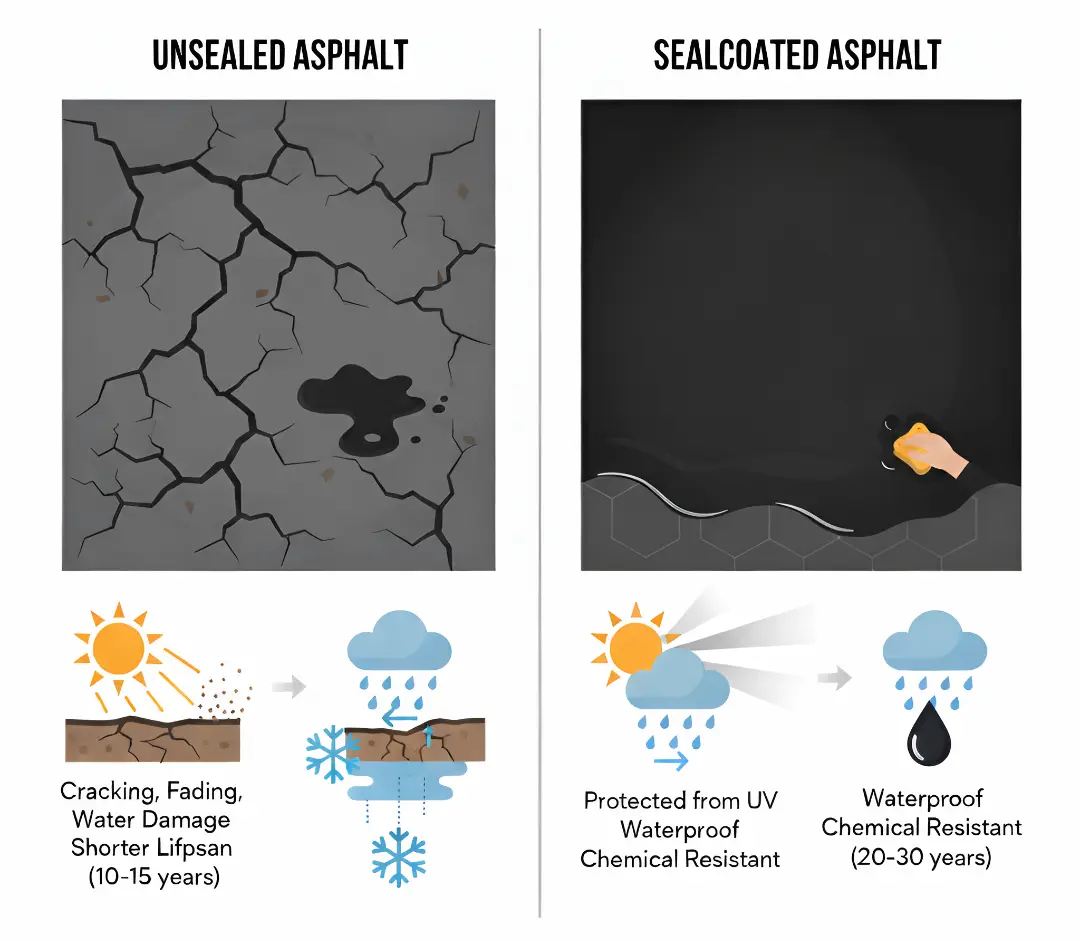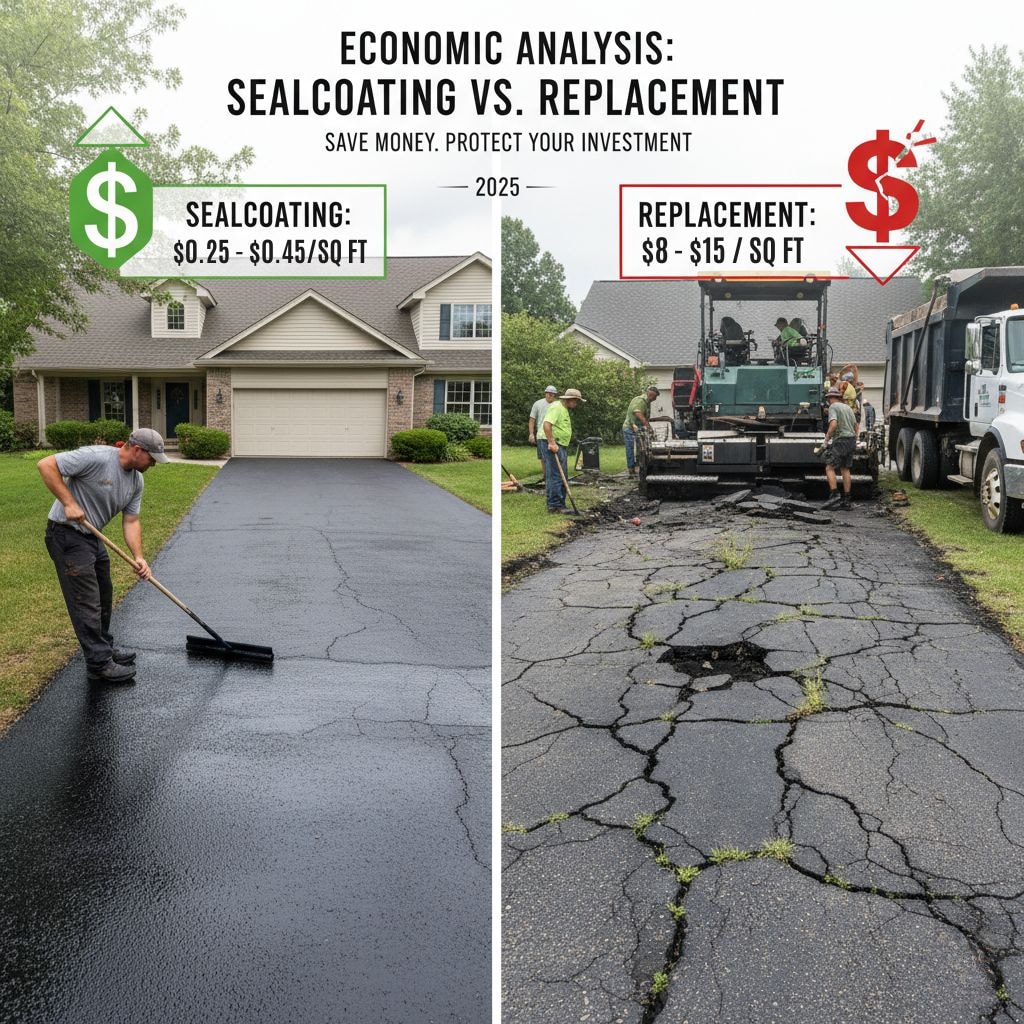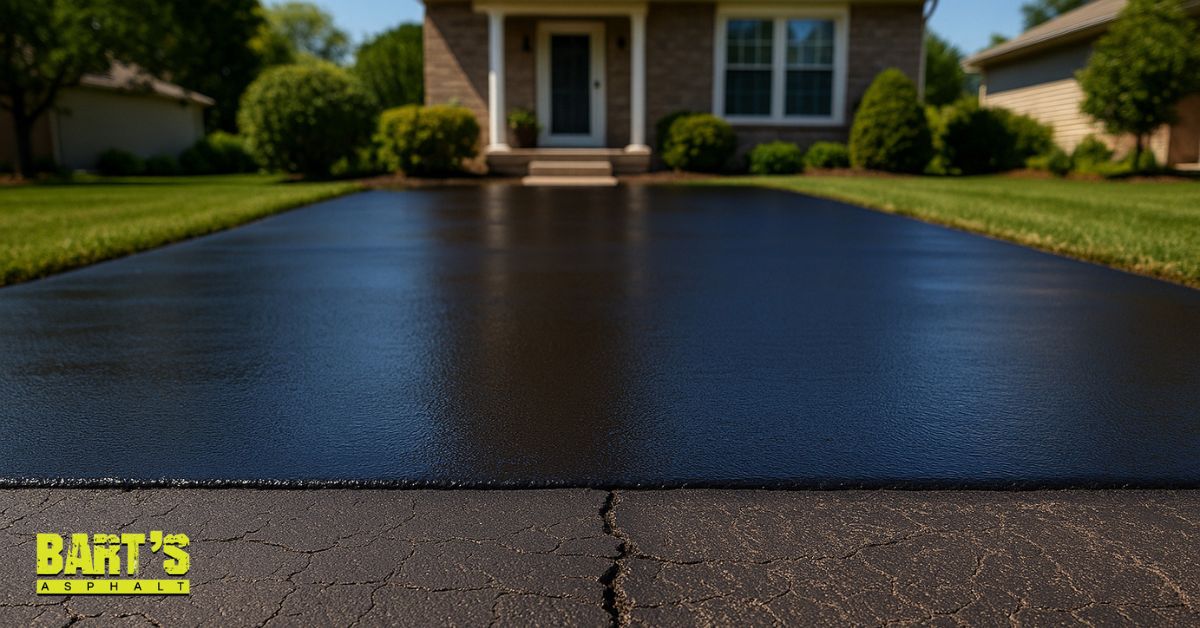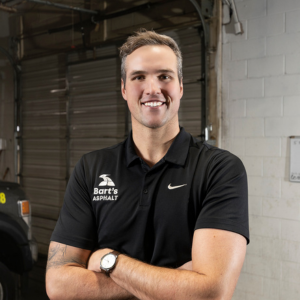Does sealcoating extend a driveway? Or is it just another maintenance myth? Well, we’re about to find out.
In this article, we’ll walk you through how professional residential driveway sealcoating services work, what benefits you can expect, and why it matters.
Key Takeaways
- Seal coating significantly extends your driveway’s life, with sealed driveways lasting 20-30 years with regular maintenance in moderate climates, compared to 10-15 years for unsealed surfaces.
- Regular seal coating protects driveways from harmful UV rays, water infiltration, and chemical spills, helping to prevent damage and avoid costly repairs, while also reducing long-term maintenance costs.
- Proper seal coating application, including correct timing, techniques, and use of high-quality sealants, is key to maximizing your driveway’s life and ensuring optimal protection and longevity for asphalt driveways.
The Role of Sealcoating in Asphalt Driveway Longevity

Sealcoating acts as a liquid protective barrier applied over asphalt surfaces to guard against damage from a variety of elements. This seal coat shields asphalt from harmful UV rays, moisture, oil and gas spills, and other chemicals, extending the lifespan of your driveway.
The coating forms a durable layer that protects the surface and helps maintain its flexibility and durability.
Regular sealcoating extends the driveway’s life remarkably, as properly maintained sealed driveways can last 20 to 30 years with consistent care in moderate climates. In contrast, unsealed surfaces typically hold up for only 10 to 15 years.
Taking this proactive step helps prevent significant damage. It keeps the driveway structure of your property intact, avoiding rapid deterioration because a coated driveway is usually more resilient to environmental damage and less likely to develop cracks and potholes.
Research from pavement experts supports this, too. Sealcoating reduces oxidation by blocking UV rays, which is a proven method to extend the life of the surface. This scientific insight backs up what homeowners have seen firsthand.
Sealcoating acts as a safeguard, preserving the driveway’s surface and improving its resilience against everyday wear and tear. But more than that, sealcoating also makes asphalt more flexible, allowing it to better handle the pressure of vehicle traffic without cracking, which is another win for durability.
Protection Against UV Rays
One of the primary benefits of sealcoating is its ability to protect asphalt driveways from the damaging effects of UV rays. Key points include:
- Without sealcoating, asphalt is exposed to harmful UV rays that cause oxidation, leading to fading and premature breakdown of the binders in the asphalt.
- Over time, this exposure makes the asphalt brittle and prone to cracks.
- Sealcoating serves as a protective layer for your driveway.
- This protective layer helps maintain the asphalt’s flexibility, ensuring it remains sturdy and less susceptible to damage.
In addition to preventing sun damage caused by the chemical reaction that occurs when UV rays hit the asphalt, sealcoating helps retain the deep black color of the asphalt, improving curb appeal and giving your driveway a fresh, new look.
Furthermore, the heat retention of the black surface allows melted ice and snow to be removed more easily, making winter maintenance more manageable.
Waterproofing Benefits
Water infiltration is a notable threat to the integrity of asphalt driveways. When water penetrates the surface, it can erode the base layer of the asphalt and the ground underneath, leading to instability and cracks, especially in colder climates where freeze-thaw cycles are common.
Sealcoating makes a driveway waterproof by repelling rain, preventing water penetration into the asphalt surface. This waterproof barrier is quite important in maintaining the stability of the driveway’s foundation, reducing the risk of erosion and instability.
Sealcoating not only prevents immediate water damage but also establishes the overall durability of the asphalt by keeping out water. This protection is particularly beneficial in regions with heavy rainfall or frequent freeze-thaw cycles, where water damage can rapidly deteriorate an unsealed driveway.
Resistance to Chemical Spills
Asphalt driveways are frequently exposed to oil and chemical spills from vehicles, which can penetrate the surface and cause great damage. Common threats include oil spills and vehicle fluids, both of which can degrade the asphalt over time.
Sealcoating creates a protective barrier that prevents these spills from seeping into the asphalt, reducing the risk of damage.
The non-porous surface created by sealcoating makes spills easier to clean, helping maintain the integrity and appearance of the driveway. Sealcoating also protects against harsh chemicals, such as de-icing solutions and gasoline, which can otherwise accelerate deterioration.
Signs Your Driveway Needs Sealcoating
Knowing when to sealcoat your driveway can save you from bigger repairs later. Watch for these clear indicators that it’s time to take action:
- Fading or Gray Color: When your driveway starts losing its rich black color and looks dull or gray, it’s a sign the protective layer is wearing off.
- Small Cracks: Minor cracks, or the appearance of new cracks, signal that the asphalt is beginning to dry out and break down.
- Rough Texture: A rough or uneven surface means the asphalt binder is deteriorating, and the driveway is more vulnerable to damage.
- Water Pooling or Not Beading: If you notice water pooling in spots or the water no longer beads on the surface, moisture is penetrating the asphalt.
- Minor Potholes: Small potholes are early warning signs of structural breakdown.
Economic Analysis: Sealcoating Costs vs. Asphalt Replacement Costs

When maintaining an asphalt driveway, cost often takes center stage. Sealcoating offers a budget-friendly way to protect your driveway, helping you avoid the much higher expense of a full asphalt replacement down the road.
Neglecting sealcoating can lead to costly repairs, as accelerated deterioration from weather, chemicals, or traffic damage may require extensive and expensive pavement fixes.
On average, professional sealcoating in 2025 runs between $250 and $600, though depending on your driveway’s size and condition, prices can range from $150 up to $1,350. That breaks down to roughly 25 to 45 cents per square foot.
Compared to the hefty $8 to $15 per square foot it costs to replace asphalt, sealcoating is a smart financial move.
Cost of Sealcoating
Several factors influence sealcoating pricing. They include driveway size, sealant type, and any needed prep work like cleaning or minor repairs. Like we’ve mentioned earlier, you can expect to pay between $250 and $600 for a professional sealcoating, but depending on local labor rates and material quality, prices might dip as low as $150 or rise to $1,350.
That’s about 25 to 45 cents per square foot, generally. It’s important to factor in any necessary cleaning or crack repairs before sealing, as these can, of course, add to the bill.
Understanding these costs and the variables behind them lets you budget wisely and ensure your driveway gets the protection it needs before damage sets in.
But of course, our team at Bart’s Asphalt can provide a FREE quote to work with. We are the premier driveway sealcoating contractors in Michigan, ready to help you with this process.
Long-Term Savings
Regularly sealing your driveway can drastically cut down the chance you’ll need a pricey asphalt replacement. When applied and maintained properly, sealcoating is a proven, cost-effective strategy to extend your driveway’s lifespan. Pair sealcoating with timely crack repairs every 2 to 3 years, and you keep your driveway in solid shape for years to come.
Keep in mind, replacing your driveway costs anywhere from $8 to $15 per square foot, so the savings add up when you avoid premature replacement. Sealcoating can add as much as 20 extra years to your driveway’s life, especially when part of a consistent maintenance routine.
That kind of longevity protects your investment and also saves you from the hassle and cost of frequent repairs or full resurfacing. Thanks to these ongoing savings, sealcoating stands out as a smart investment that keeps your driveway performing well without draining your wallet.
Best Practices for Effective Sealcoating
To get the most out of sealcoating, it’s important to clean and repair your driveway properly first. Paying attention to timing, application methods, and using quality sealants can make all the difference.
In the next sections, we’ll break down these key steps with practical tips to help you sealcoat like a pro, including how to evenly coat asphalt for the best results.
Timing and Frequency
Experts recommend the following for sealcoating application:
- Reapply sealcoating every 2-3 years depending on usage and environmental factors.
- Residential driveways should generally be sealed every 2-3 years.
- Commercial lots may require annual treatment due to heavier traffic.
- The first coat of sealcoating should ideally be applied within 12-18 months after asphalt installation for effective maintenance.
Keep in mind that both weather conditions and traffic volume can affect how frequently sealcoating is needed. High traffic volume or harsh weather conditions may require more frequent applications.
Adhering to this schedule keeps driveways protected and maintains their structural integrity over the years.
Proper Application Techniques
Before applying sealant, consider the following for effective sealcoating:
- The surface is free from oil stains, as these can affect adhesion.
- Remove all debris, including dust, sand, and dirt, from the driveway surface before application.
- Apply the sealant using proper timing and technique.
- Maintain temperature conditions between 50-85°F.
- Perform thorough cleaning.
- Ensure ideal temperature conditions are met.
Following these techniques with a proactive approach helps maintain driveways in top condition.
DIY vs. Professional Sealcoating
Taking on sealcoating yourself can save you $200 to $400 compared to hiring a professional, but it comes with risks like uneven coverage and shorter-lasting results.
Here’s a quick overview of the DIY process if you decide to try it yourself:
- Clean the driveway thoroughly, removing debris, oil stains, and dirt.
- Fill cracks and potholes with appropriate patching material.
- Plan your work for days when the temperature is between 50 and 85°F for optimal drying.
- Use a squeegee or brush to apply the sealant evenly in thin layers.
- Allow the sealcoat to dry fully before driving on it, usually 24 to 48 hours.
| Aspect | DIY | Professional |
| Cost | Saves $200–400 | Higher upfront cost |
| Material Quality | Consumer-grade | Commercial-grade for durability |
| Application | Risk of uneven coverage | Even, smooth application |
| Durability | Shorter lifespan (1–3 years) | Lasts 2–3 times longer |
| Time and Effort | Requires your time and labor | Done quickly by experts |
| Equipment | Basic tools needed | Professional-grade equipment |
| Risk of Mistakes | Higher, affecting performance | Minimal with experience |
Choosing between DIY and professional sealcoating depends on the kind of property you have; commercial, residential, religious, governmental, or recreational. Also, your budget, time, and how long you want your driveway to last are non-negotiable factors.
Choosing Quality Sealants
Sealants come in various types, with coal tar and new asphalt emulsion being the most common options available on the market.
Coal tar provides better protection against petroleum-based contaminants, making it preferred for areas with frequent oil and gas exposure. Professionals typically prepare the surface and may recommend high-quality sealants for better performance.
Environmental Considerations of Sealcoating
Two common types of sealants are coal tar-based and asphalt emulsion-based.
Coal tar sealants are known for their strong chemical resistance and durability, making them effective at protecting asphalt from oil, gas, and other spills. However, coal tar contains high levels of polycyclic aromatic hydrocarbons (PAHs), which are toxic and can contaminate local water sources through runoff.
Because of these environmental risks, coal tar sealants are banned or heavily restricted in many regions.
On the other hand, asphalt emulsion sealants offer a more eco-friendly alternative. While they may provide slightly less chemical resistance compared to coal tar, they have a much lower environmental impact due to fewer harmful pollutants.
For homeowners seeking a balance between protection and environmental responsibility, asphalt emulsions are often the preferred choice.
| Sealant Type | Pros | Cons | Environmental Impact |
| Coal Tar | Excellent chemical resistance; durable | Contains toxic PAHs; banned in some areas | High toxicity; harmful runoff potential |
| Asphalt Emulsion | Lower toxicity; eco-friendlier | Slightly less chemical resistance | Much lower environmental impact |
Choosing the right sealant means weighing protection needs against environmental considerations to find the best fit for your driveway and your community.
Common Concerns and Misconceptions About Sealcoating
Despite its many benefits, there are common concerns and misconceptions about sealcoating that often deter homeowners from investing in this protective measure.
One common misconception is that sealcoating will repair cracks; however, sealcoating does not repair cracks, and any cracks should be repaired before sealcoating is applied.
Amongst other things, neglecting asphalt sealing leads to increased cracks and potholes, fading and staining, a shortened lifespan, higher repair costs, and structural damage.
It’s important to address these concerns and provide accurate information to help homeowners make informed decisions about sealcoating.
Can Sealcoating Fix Structural Damage?
Sealcoating is primarily a preventative treatment designed to protect asphalt surfaces. It cannot repair structural defects or restore severely damaged pavement. But it works best on pavements that are in good to fair condition, providing a protective layer that helps maintain their integrity.
For driveways with significant damage, such as deep cracks or extensive damage from potholes, more substantial repairs will be necessary before applying a seal coat.
Over-Application Risks
Excessive application of sealcoating can lead to flaking and premature failure of the sealant. Over-application can trap moisture beneath the surface, leading to premature damage and failure of the asphalt.
Proper application frequency is fundamental to avoid these issues. Plus, it establishes the longevity of the seal coat.
However, applying sealcoating too frequently can be counterproductive, causing more harm than good. Therefore, it is advisable to follow recommended application schedules and avoid over-application.
Summary
Sealcoating plays a key role in keeping your asphalt driveway in top shape, offering benefits that help it last longer and look better. Treating sealcoating as part of your regular maintenance routine is a smart move that saves you money and stress down the line.
If you want to keep your driveway strong and looking its best, now’s the perfect time to take action and give it the protection it deserves. Contact us today and let’s help you get started.
Frequently Asked Questions
Have questions? We’re happy to help!
How often should I seal my asphalt driveway?
Sealing your asphalt driveway every 2-3 years is essential for maintaining its integrity and appearance.
Can sealcoating fix structural damage in my driveway?
Sealcoating cannot fix structural damage in your driveway; it serves only as a preventative measure for maintaining the surface.
What are the average costs associated with sealcoating?
The average cost for sealcoating an asphalt driveway is approximately $490, generally ranging between $160 and $1,000. This variation often depends on factors such as driveway size and local labor rates.
Does sealcoating help with water damage?
Yes, sealcoating helps with water damage by creating a waterproof barrier that prevents water from penetrating the asphalt and causing harm.
What type of sealant should I use for my driveway?
For your driveway, it’s best to use a high-quality coal tar sealant, as it offers superior protection against petroleum-based contaminants. This type of sealant is particularly effective in areas with frequent exposure to oil and gas.



